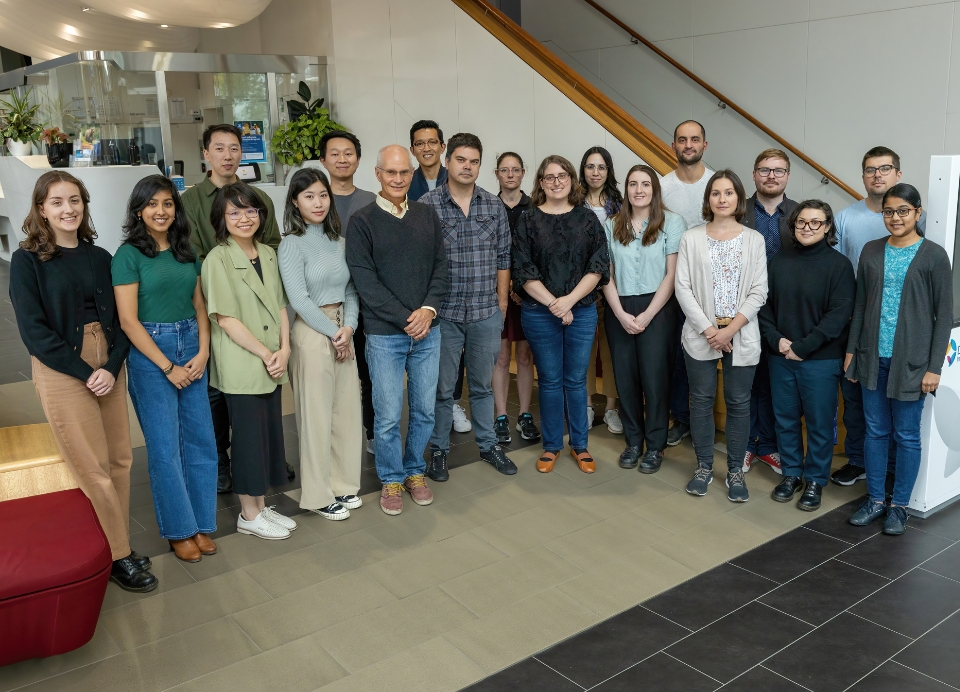-
Research Groups
Clinical Research
-
Kent Group
Stephen’s group studies immunity to HIV, influenza and SARS-CoV-2. They are analysing a variety of vaccine strategies, including nanoparticle-based vaccines. They are studying a series of immune responses to gain better insights into protective immunity to important viral pathogens. They are developing monoclonal antibody therapies for HIV, influenza and SARS-CoV-2 to improve the treatment of these infections. The Kent group works very closely with Dr Amy Chung’s laboratory at the Doherty Institute.
Other work areas include:COVID-19, Immunology, Influenza
Current Projects
-
Antibody dependent cellular cytotoxicity (ADCC) - a neglected anti-HIV immune response!
The importance of HIV-specific Antibody-dependent Cellular Cytotoxicity (ADCC) antibodies that inhibit viral replication mediated through the Fc receptor is becoming clear. In view of the difficulty of inducing broad neutralising antibodies and effective T cell immunity, exploring HIV-specific ADCC is a priority. HIV-specific ADCC has been under-explored both from the point of view of rapid, reliable assays to measure and characterise ADCC responses and the ability to specifically induce high level HIV-specific ADCC antibodies by vaccination. Recent data from the RV144 vaccine study in Thailand suggest a role for non-neutralising antibodies in protection from HIV.
-
Combined Influenza-AIDS Vaccines
Influenza and HIV are both serious global pathogens. Can a single vaccine be designed to cover both viruses? Recent advances in reverse genetic techniques allow insertion of foreign antigens into live influenza viruses. Further, live attenuated influenza vaccines are now highly effective vaccines. Stephen’s group is designing recombinant influenza vaccines with inserted HIV antigens to test as a combined Influenza-AIDS vaccine. An advantage of this strategy is that as a mucosal virus, there is a strong likelihood that immunity at mucosal surfaces, where HIV is first encountered, can be induced with this approach.
-
Nanoparticle HIV vaccines
No safe HIV vaccines have been able to stimulate durable, activated T-cell immunity. Stephen’s group is investigating an exciting HIV vaccination approach using hollow, submicron, delivery vehicles (nanocapsules) as carriers for HIV vaccines. This is a novel, cross-disciplinary project within the Australian Research Council (ARC) Centre of Excellence in Bio-Nano interactions. Nanocapsules are designed to induce optimal immune responses by protecting antigens from degradation prior to reaching sites of immune activation and activate antigen presenting cells in a way that will initiate anti-viral immune responses. Stephen’s group aims to use controlled-release nanocapsules to stimulate durable anti-HIV responses in vivo.
-
NKT cells, MAIT cells and HIV
NKT cells are a small but very important lymphocyte population in blood that possess potent antiviral and antitumor activities. NKT cells are depleted during HIV infection. Stephen’s group are now devising strategies to enhance the biologic utility of NKT cells in fighting HIV. They are also starting to study an interesting population of cells called Mucosal-associated Invariant T cells (MAIT cells). MAIT cells are likely to be important in protecting HIV-infected people from damage at mucosal surfaces such as the gut.
-
Checkmating HIV - trapping immune escape HIV strains
CD8+ cytotoxic T lymphocytes (CTL) can be effective at controlling HIV-1, but their utility is partly offset by mutational escape. The kinetics of CTL escape, and reversion of escape mutant viruses upon transmission to MHC-mismatched hosts can help understand CTL-mediated viral control and the fitness cost extracted by immune escape mutation. The work has implications for how best to control HIV during early infection.
-
HIV Vaccines
A HIV vaccine is urgently needed. The Kent lab is working towards this goal. Our dedicated staff and students drive innovation and new thinking in ways to tackle the HIV/AIDS epidemic. To further understand how immune responses can control HIV, we have a series of projects involved in developing new assays to measure immunity and the effect these immune responses have on the virus. We have extensively studied antibody dependent cellular cytotoxicity (ADCC), which appears to play a role in vaccine-induced immunity to HIV. We are also trying to understand how neutralising antibodies that have ADCC activity can control HIV. We have ongoing projects led by Dr Jen Juno studying small but important lymphocyte populations such as T-follicular helper cells, gamma-delta T cells, MAIT cells and NKT cells. In work with European collaborators, we are now studying multivalent HIV-1 Env based SOSIP trimer vaccine strategies.
Lab Team

-
Laboratory Head
-
Laboratory Head
-
Hyon-Xhi TanResearch Officer
-
Research Fellow
-
Research Officer
-
Mai Ngoc VuPostdoctoral Fellow
-
Lara SchwabResearch Officer
-
Mitchell ZhengPostdoctoral Fellow
-
Rosela WebsterPostdoctoral Fellow
-
Chris GonelliResearch Officer
-
Palak MehtaResearch Officer
-
Thakshila AmarasenaResearch Support Officer
-
Andrew KellyResearch Assistant
-
Lauren BurmasResearch Assistant
-
Julie NguyenResearch Assistant
-
Robyn EsterbauerResearch Assistant
-
Ellie ReillyResearch Assistant
-
Jane BattenProject Manager
-
Janavi RambhatlaAcademic Specialist - Research Officer
-
Devaki PilapitiyaPhD Student
-
Ruth PurcellPhD Student (co-supervisor with Amy Chung)
-
Kirsty FieldPhD Student
-
Thu DoPhD Student
-
Yee-Chen LiuPhD Student
-
Veronica ZoestPhD Student
-
Nanouk ZuidmeerInternational Masters Student Placement
-
Professor David O'ConnorHonorary
-
Professor Shelby O'ConnorHonorary
-
Dr David (Yi) JuHonorary
-
Dr Hillary VandervenHonorary
-
A/Prof Matt ParsonsHonorary
-
Dr Nghia TruongHonorary
-
Dr Sinth JegaskandaHonorary
-
A/Prof Steve RockmanHonorary
-
Dr Emily PilkingtonGuest Scientist
-
Dr Shiyao LiGuest Scientist
-
Diyana HassanelGuest Scientist
-
Zihnil MazradGuest Scientist
-
Chibo Group
The HIV Characterisation laboratory performs testing to monitor HIV-infected individuals prior to and upon commencement of antiretroviral treatment. Additionally, genotype-assisted antiretroviral resistance testing is available, which identifies the presence of drug resistance mutations so that targeted treatment choices can be made.
-
Nicholson Group
Suellen's group fulfills a dual mission of providing a technically first class, reliable diagnostic, reference and public health service to the healthcare system, and being an innovative, adaptable, forward-looking component of the scientific community and a valued collaborator in research projects, not just in Victoria, but nationally and in the region.
Other work areas include:Hepatitis
-
Purcell Lab
Professor Damian Purcell’s research group investigates the HIV-1 and HTLV-1 human retroviruses that cause AIDS and leukaemia/inflammatory pathogenesis respectively. The lab studies their genetic structure and gene expression with a focus on defining the mechanisms that control viral persistence and pathogenesis. The molecular interplay of viral and host factors during viral infection and the innate and adaptive immune responses to viral infection are examined. These molecular insights are used to develop new antiviral and curative therapeutics, preventive prophylactic vaccines and passive antibody microbicides and therapeutics. Some of these patented discoveries have been commercialised and we are assisting with clinical trials.
Other work areas include:COVID-19, Immunology, Viral Infectious Diseases, Bacterial and Parasitic Infections
Clinical research in HIV at the Doherty Institute is focused on understanding the barriers to curing HIV infection and developing therapeutic strategies to overcome these. In addition, the Doherty Institute has an active translational research program aimed at understanding how the immune system recovers following treatment of HIV infection and the impact of co-infections that occur commonly in low income countries, including hepatitis B virus (HBV).
Researchers are conducting a range of observational studies understanding where the virus hides on antiviral therapy (ART), and using blood and tissue samples collected from HIV-infected participants they are identifying new drugs that activate or eliminate the virus. Other observational studies are investigating the interaction of HIV and HBV, cytomegalovirus and Cryptococcus, the frequency of HBV drug resistance in HIV-HBV co-infection, and the impact of immune activation on immune function and liver disease following ART. In addition, researchers are leading a range of multi-site local, national and international interventional studies to investigate new interventions that may eliminate persistent virus.
Some of the Doherty Institute’s key collaborators in clinical research activities include the Department of Infectious Diseases at the Alfred Hospital; University of California San Francisco, San Francisco, USA; the Thai Red Cross, Bangkok, Thailand; and the University of Malaya, Kuala Lumpur, Malaysia.
If you are interested in volunteering in the Doherty Institute's clinical trials, please see the projects that are now recruiting volunteers.
Now recruiting volunteers
-
HIV
Do you have HIV and about to undergo immunotherapy for cancer?
Volunteers needed for a study where extra blood tests will be taken during immunotherapy treatment for cancer.
Current projects
-
Hepatitis HIV
A surveillance program for the detection of hepatitis B virus (HBV) resistance to tenofovir (TDF) in HIV-HBV co-infected patient
-
HIV
Circadian HIV RNA Oscillations and Outcomes of Stress (CHRONOS)
-
HIV
Dolutegravir intensification study (DIORR)
-
HIV
Would you like to take part in a study to see where HIV hides in the body?
-
HIV
Imaging the reservoir (iPHOTO3)
-
HIV
Investigating the effects of interferon on HIV persistence in HIV infected patients on ART
-
Hepatitis HIV
Long-term persistence of HIV in the liver and the clinical impact on HIV-HBV co-infection (CHHANEL)
-
HIV
The START HIV-1 Reservoir Sub-study
-
Hepatitis HIV
Towards a Functional cure for HBV: exploiting lessons from HBV-HIV co-infection
-
HIV
Interested in HIV cure research? (Vitamin D study)
Volunteers needed for a clinical trial to test whether high dose vitamin D can reduce HIV that persists despite antiretroviral therapy.
-
HIV
Would you like to help researchers eradicate HIV?
Volunteers needed for a study where large volume of white blood cells are collected to understand where HIV hides on treatment and how to get rid of HIV from its hiding place.
-
More in HIV
36.9
million
people are infected with HIV
2
million
new infections in 2014





